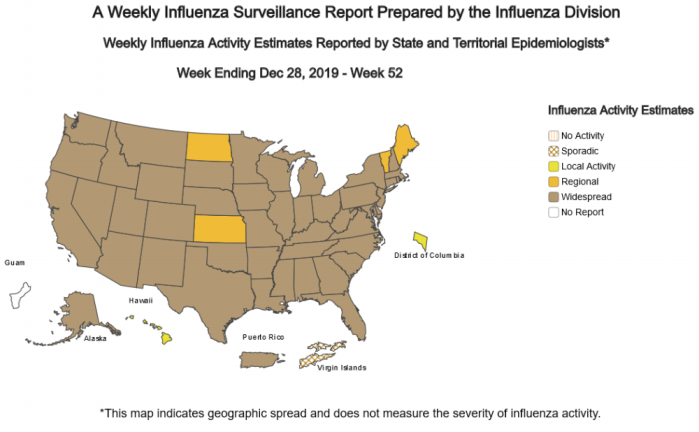Tristate health officials: Flu season is packing a punch
Public health. Amid a more active than normal flu season in the tristate area, health officials stress the importance of vaccination, saying there is "no better measure to protect yourself."


To hear tristate public health officials tell it, this year’s flu season is packing quite the punch.
As the director of primary care for Orange Regional Medical Group, in Middletown, N.Y., Dr. Joseph Chavez Carey has seen a lot more clinic visits for flu this year.
“In one word, it’s been bad,” he said. “The past couple of years have been pretty bad flu seasons. It seems like we’re seeing more patients with the flu, it seems like the flu cases are more severe.”
Chavez Carey said that, despite recent personal experience, he highly recommends vaccination as the best preventive measure for flu.
“My whole family got hit with it, actually, even though we got the shot,” he said. “Five of us got the shot and only three of us actually got the flu, so, to me, that’s pretty good. If it’s going to prevent flu in two out of five people, it’s still probably worth it.”
'Very active' in Pennsylvania
At Wayne Memorial Hospital in Honesdale, Pa., public relations manager Lisa Champeau said doctors there have seen 100 cases of flu so far this season, and that it has been “very active” since early December.
“People have been pretty sick,” she said.
Champeau said that when patients come in for flu, they typically receive a prescription for the antiviral medication Tamiflu and are sent home to rest.
This year, multiple strains of flu are going around, she said, including A, B, and H1N1 varieties.
According to the Pennsylvania Department of Health, the spread and severity of flu varies widely from season to season.
Pike County saw 39 confirmed cases of flu between Sept. 29 and Dec. 28, 2019, according to the department.
“It is estimated that five to 20 percent, or 600,000 to 2.4 million, of Pennsylvanians get the flu each year, and 120 to 2,000 die from complications,” the department said.
To date, there have been nine flu-associated deaths, according to the department, all of which have occurred in patients aged 50 years or older.
“It is difficult to compare flu seasons because there are a variety of factors that come into play," said Brittany Lauffer, public information officer for the health department.
“Looking at this flu season, we saw cases start later, but they were immediately widespread,” she said. “However, once we hit November and December, we have seen higher than normal cases than the previous year.”
Chavez Carey said indications about what kind of flu season we’re likely to have sometimes come from the land Down Under.
“Australia had a bad year and they’re opposite from us season-wise, so their flu season can sometimes predict what our flu season is going to be like,” he said.
As the season drags on, Lauffer stressed the importance of vaccination.
“It is not too late, and there is no better measure to protect yourself from the flu,” she said.
'Higher than typical' in New Jersey, but 'not unusual'
In New Jersey, all regions of the state have been experiencing high levels of flu activity, according to the New Jersey Department of Health, with the predominant strain this season being influenza B.
Donna Leusner, director of communications for the department, said that the state is heading into peak flu season.
“While flu activity is higher than typical, it is not unusual,” she said. “We don’t know exactly when peak will hit, but this is usually around the time we see it.”
At Saint Clare’s Health, Marketing and Communications Director Patricia Montgomery said Morris County went into a state of high flu activity on Dec. 21, 2019.
“Since Sept. 1, 2019, Saint Clare’s Health has confirmed 220 positive flu cases within our facilities,” she said.
Of those cases, 93 patients tested positive for influenza A and 130 patients tested positive for influenza B.
Three patients tested positive for both influenza A and B, Montgomery said.
The healthcare provider has hospital locations in both Denville and Dover.
A pediatric death in New York
Not immune to the trend, hospitals in the Bon Secours Charity Health System in New York have also seen a spike in this season’s flu activity.
Without providing numbers, Helene Guss, communications director for Bon Secours, said both St. Anthony Community Hospital, in Warwick, and Good Samaritan Hospital, in Suffern, have seen an increase in flu cases this season.
In addition to the increase, Guss also said the cases have been earlier in the season this time around.
According to the New York State Department of Health, 9,211 laboratory-confirmed flu cases were reported to the department during the last week of 2019, which represents a 74 percent increase in cases from the week prior.
For the week ending Dec. 28, 2019, there were 157 confirmed cases of flu in Orange County, according to the department.
In total, 22,763 confirmed cases of flu have been reported to the health department so far this season.
The number of weekly hospitalizations has also increased, according to the department, with 1,387 New Yorkers hospitalized for lab-confirmed flu, up 119 percent from the last week of December.
To date in New York, there have been 3,592 flu-related hospitalizations and one flu-associated pediatric death.
While the effectiveness of the flu vaccine can vary, recent evidence suggests this year's flu vaccine is well-matched to the flu viruses that are circulating this season, the health department said.
In general, according to the department, flu vaccines tend to work best against influenza A and B viruses.
Even though it takes a couple weeks for the flu shot to be effective, Chavez Carey said getting it now is the best way to prevent getting flu later in the season.
“This thing is still ripping right along and it’s not in any way looking like it’s starting to slow down,” he said. “I think we’re in for at least a couple more months of flu season.”
Leusner said flu season lasts through April.